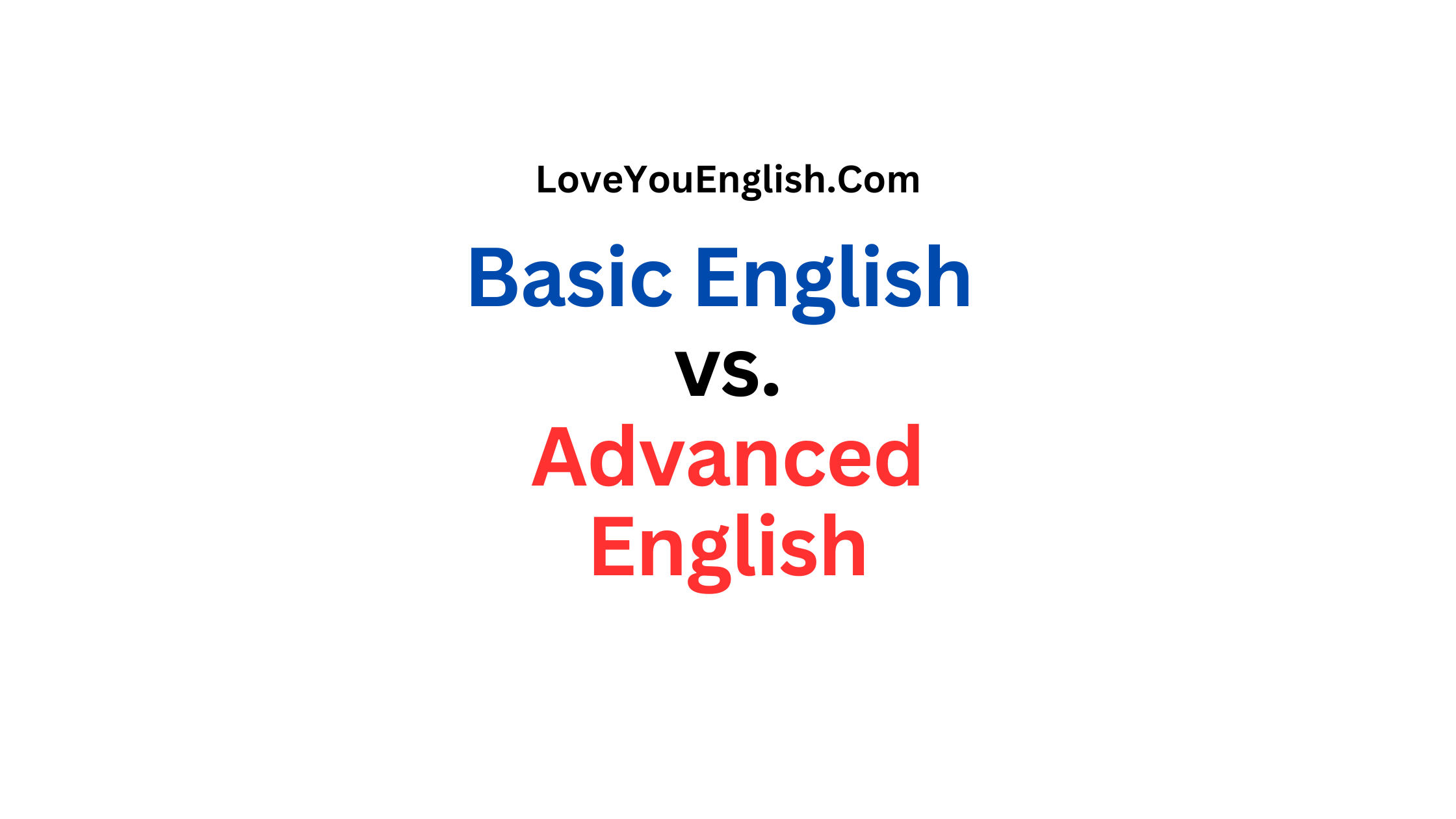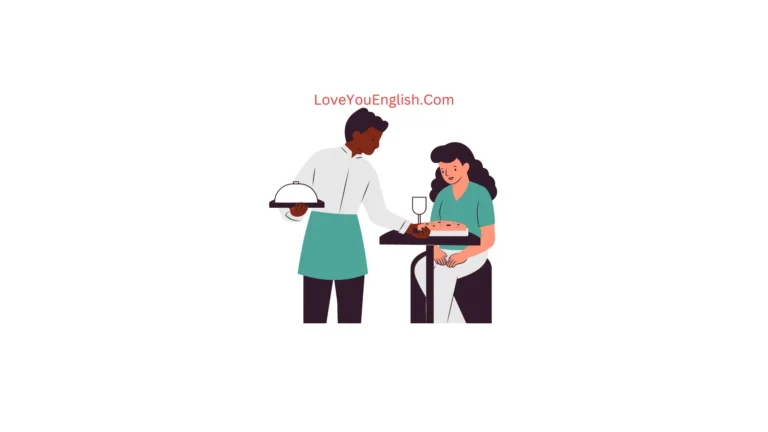Many English learners wonder what really separates basic English from advanced English. Is it just about difficult vocabulary, or is there more to it? Understanding the difference between basic and advanced English can help you set clear learning goals and improve your language skills step by step. Whether you are a beginner building your foundation or an intermediate learner aiming for fluency, knowing where you stand is important.
In this blog post, you will explore the key differences between basic English and advanced English in terms of vocabulary, grammar, sentence structure, and communication style. With simple explanations and practical examples, you will clearly understand what changes as your English level improves. By the end, you will also know how to move from basic communication to more confident and advanced expression.
What Is Basic English?
Basic English is the simplest form of the English language.
It uses easy words, short sentences, and clear ideas. Think of it as the foundation of English.
It’s what you learn when you first start studying the language.
Basic English helps you communicate everyday needs and ideas without confusion.
For example, in Basic English, you might say:
“I want food.”
This sentence is short and uses simple words.
It’s easy to understand, even for someone new to English.
Basic English focuses on:
- Simple vocabulary: Words like “eat,” “go,” “house,” or “happy.”
- Short sentences: Usually one idea at a time.
- Basic grammar: Simple tenses like present (“I walk”) or past (“I walked”).
- Clear meaning: No idioms, slang, or complicated phrases.
Basic English is perfect for beginners because it’s practical.
You can use it to talk about daily life—like shopping, asking for directions, or greeting someone.
It’s also great for young learners or people in non-English-speaking countries who need functional communication.
What Is Advanced English?
Advanced English is more complex.
It’s what native speakers or fluent learners use to express detailed ideas, emotions, or arguments.
Advanced English includes bigger words, longer sentences, and creative ways of speaking or writing. It’s like adding colors and details to a simple drawing.
For example, instead of saying “I want food,” an advanced speaker might say:
“I’m absolutely starving and could really go for a hearty meal right now.”
This sentence uses stronger words (“starving,” “hearty”) and expresses more emotion.
Advanced English includes:
- Rich vocabulary: Words like “exhilarating,” “profound,” or “meticulous.”
- Complex sentences: Combining multiple ideas, like “Although I was tired, I stayed up late because the book was so exciting.”
- Advanced grammar: Tenses like present perfect (“I have just finished”) or conditionals (“If I had known, I would’ve come”).
- Figurative language: Idioms, metaphors, or slang, like “It’s raining cats and dogs” for heavy rain.
Advanced English is used in professional settings, academic writing, or creative storytelling.
It’s what you hear in debates, read in novels, or see in business emails.
It allows you to sound polished, persuasive, or artistic.
Why Does the Difference Matter?
Understanding the difference between Basic and Advanced English is important for several reasons:
Learning Goals: Knowing where you stand helps you set goals. If you’re at a basic level, you can focus on building confidence with simple communication. If you’re ready for advanced English, you can work on sounding more natural or professional.
Communication: Basic English is enough for simple conversations, like ordering food or asking for help. But Advanced English lets you discuss deeper topics, like politics, emotions, or science, with clarity and style.
Confidence: Mastering Basic English gives you the confidence to speak without fear. Advanced English builds on that, helping you feel proud of expressing complex thoughts.
Opportunities: Many jobs, schools, or social situations require Advanced English. For example, writing a resume or giving a presentation needs more than basic phrases.
By understanding these levels, you can decide what skills to practice and when to push yourself further.
Key Differences Between Basic and Advanced English
Let’s break down the main differences in a way that’s easy to understand.
1. Vocabulary
Basic English sticks to common words you use every day. For example:
- Basic: “I’m sad.”
- Advanced: “I’m feeling quite melancholic.”
Advanced English uses synonyms (words with similar meanings) to add variety. It also includes technical terms or words specific to certain topics, like “biodiversity” for science or “litigation” for law.
Example:
- Basic: “The movie was good.”
- Advanced: “The film was captivating and beautifully directed.”
2. Sentence Structure
Basic English uses short, straightforward sentences. Each sentence usually has one main idea.
- Basic: “I like dogs. They are cute.”
Advanced English combines ideas into longer sentences with connectors like “because,” “although,” or “while.”
- Advanced: “I’ve always loved dogs because their playful nature and loyalty make them wonderful companions.”
Advanced sentences might also use clauses or phrases to add detail, making the language sound more sophisticated.
3. Grammar
Basic English relies on simple grammar rules. You learn the present, past, and future tenses first. For example:
- Basic: “She walks to school.”
Advanced English uses more complex grammar, like passive voice, conditionals, or modals.
- Advanced: “Had she known about the meeting, she would have prepared thoroughly.”
This allows advanced speakers to talk about hypotheticals, possibilities, or nuanced situations.
4. Tone and Style
Basic English is direct and focuses on clarity. It doesn’t worry about sounding formal or creative.
- Basic: “Please come to my party.”
Advanced English adjusts tone and style based on the situation—formal, casual, persuasive, or poetic.
- Advanced: “I’d be delighted if you could join us for the celebration.”
Advanced speakers also use humor, sarcasm, or politeness to match the context.
5. Idioms and Expressions
Basic English avoids idioms because they can be confusing. For example, a beginner learns to say:
- Basic: “It’s raining a lot.”
Advanced English embraces idioms and cultural phrases to sound natural.
- Advanced: “It’s pouring buckets out there!”
Idioms make conversations lively but require cultural knowledge to understand.
6. Listening and Comprehension
Basic English is easier to understand because it’s predictable. You hear simple words and clear ideas.
- Basic: “I need a pen.”
Advanced English can be harder to follow because it includes fast speech, slang, or references to culture.
- Advanced: “Could you lend me a pen? I’m totally swamped and forgot mine.”
Advanced listeners need to catch subtle meanings or implied ideas.
How to Move from Basic to Advanced English
If you’re at a basic level, don’t worry—everyone starts there! Moving to Advanced English takes time and practice.
Here are some practical steps to help you improve:
1. Build Your Vocabulary
- Read more: Start with simple books, then try novels, articles, or blogs. Highlight new words and look them up.
- Use synonyms: Instead of saying “big,” try “huge,” “enormous,” or “massive.”
- Learn topic-specific words: If you’re interested in cooking, learn words like “sauté,” “simmer,” or “garnish.”
2. Practice Complex Sentences
- Combine ideas using words like “and,” “but,” “because,” or “although.”
- Example: Instead of “I was late. The bus broke down,” say, “I was late because the bus broke down.”
- Write longer sentences and ask a teacher or friend to check them.
3. Study Advanced Grammar
- Learn new tenses, like present perfect (“I have just eaten”) or past perfect (“I had finished”).
- Practice conditionals: “If I study, I will pass.”
- Try passive voice: Instead of “Someone stole my bag,” say, “My bag was stolen.”
4. Listen and Imitate
- Watch English movies, TV shows, or YouTube videos. Pay attention to how native speakers talk.
- Repeat phrases you hear to practice pronunciation and tone.
- Listen to podcasts or speeches to hear advanced vocabulary and ideas.
5. Learn Idioms and Slang
- Study common idioms, like “kick the bucket” (to die) or “under the weather” (feeling sick).
- Use apps or websites to learn one idiom a day.
- Practice idioms in conversation, but make sure they fit the context!
6. Speak and Write Regularly
- Join English conversation groups or language apps to practice speaking.
- Write essays, emails, or journal entries using new words and grammar.
- Ask for feedback from teachers, friends, or online communities.
7. Be Patient
- Moving to Advanced English doesn’t happen overnight. Celebrate small wins, like using a new word correctly.
- Mistakes are okay—they’re part of learning!
Challenges of Advanced English
While Advanced English opens doors, it comes with challenges:
- Confusion: Idioms or slang can feel like a puzzle. For example, “hit the nail on the head” doesn’t literally mean hitting a nail—it means being exactly right.
- Overwhelm: The huge number of words and rules can feel daunting. English has many synonyms, and choosing the right one takes practice.
- Cultural gaps: Advanced English often includes references to history, pop culture, or humor that might not make sense to non-native speakers.
- Pronunciation: Longer words or fast speech can be hard to say or understand.
To overcome these, keep practicing, ask questions, and stay curious about the language.
When to Use Basic vs. Advanced English
Both Basic and Advanced English have their place. Here’s when to use each:
Use Basic English:
- When talking to beginners or non-native speakers.
- In emergencies, to be clear and quick.
- When you’re tired or nervous and want to avoid mistakes.
- For simple tasks, like ordering food or giving directions.
Use Advanced English:
- In professional settings, like job interviews or emails.
- When writing essays, stories, or speeches.
- To express complex ideas, like debating or explaining feelings.
- To sound natural and blend in with native speakers.
The key is knowing your audience and purpose. Sometimes, simple is best. Other times, advanced language adds impact.
Final Thoughts
Basic English and Advanced English are like two sides of a ladder.
Basic English gets you started, helping you climb with confidence.
Advanced English takes you higher, letting you reach new heights of expression and connection.
Both are valuable, and neither is “better”—they serve different needs.
If you’re learning English, start with the basics and enjoy the process of growing.
Practice daily, stay patient, and don’t be afraid to make mistakes.
With time, you’ll find yourself using Advanced English naturally, whether you’re telling a story, sharing an opinion, or chasing a dream.
So, where are you on your English journey?
Whether you’re mastering “hello” or tackling “serendipity,” keep going—you’ve got this!




